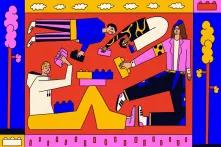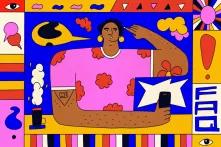On 25.02.2021, Wolfgang Thierse, former President of the Bundestag, gave an interview to Deutschlandfunk in which he commented on the issue of identity politics. The context of this conversation was an article Thierse had written a few days earlier on the topic that made reference to the initiative ActOut, a manifesto by lesbian, gay, trans, queer, inter and non-binary actors on discrimination in film and theatre.

On 25.02.2021, Wolfgang Thierse, former President of the Bundestag, gave an interview to Deutschlandfunk in which he commented on the issue of identity politics.[1] The context of this conversation was an article Thierse had written a few days earlier on the topic that made reference to the initiative ActOut, a manifesto by lesbian, gay, trans, queer, inter and non-binary actors on discrimination in film and theatre.[2]
Thierse addresses a phenomenon, which he calls “the identity politics of the left”. He writes that this variety of politics leads to him, along with other commentators, no longer being measured against their arguments, but rather the fact that they are old white men. To be honest, it is not entirely clear to me why left-wing identity politics and the critique of discrimination are being identified with each other at this point, but I would nevertheless like to take the former President of the Bundestag’s request seriously and, in this short text, comprehend and discuss a few of his arguments that lead to this central thesis:
In many respects, critique of discrimination is far removed from democracy and anti-democratic. Practices such as the renaming of streets or the toppling of statues amount to a cleansing of history that is not commensurate with democracy.
Double Standards
Now you might think that construction projects, from the Berlin Palace to the Humboldt Forum, the Garrison Church in Potsdam, the Holocaust Memorial and Neue Wache, constitute a kind of politics of memory with the means of city planning. Interventions, perhaps the most distinct being the Berlin Palace, that could also be described as a state-sponsored cleansing of history of its own violence. The good Prussian palace with its luminous dome and ethnological collection is a somewhat peculiar narrative for post-national socialist Germany.
But that is not what is meant when Thierse refers to a cleansing of history. As one of the most important supporters in the reconstruction of the Berlin Palace, for him it is not about these forms of the state’s politics of memory, as peculiar as they may be. Rather his argumentation is levelled at the criticisms of these structural and urban planning decisions, which he feels are not commensurate with democracy. This double standard is no coincidence, but part of a self-image that is universal and enlightened, as Thierse outlines in the interview with Deutschlandfunk as follows:
“[O]urn tradition since Enlightenment has been that the decisive factor should not be the consternation, not the subjective feeling, but the rational argument; that has to connect us, that has to structure discourse.”[3]
The former President of the Bundestag see this tradition as in danger, because society is currently experiencing a “wave of iconoclasm, the effacement of names, the denunciation of great minds”.[4] On one side, according to Thierse, there is therefore an objective attitude that led to the construction of a city palace with ethnological collections, in the heart of the German capital. On the other, are the critics who are questioning this decision, citing Germany’s history of colonial violence, and thus pursuing subjective and dishonest motives. This juxtaposition is really something.
An important punch line of the widespread ideology of universalism says that they themselves are acting universally while the other side is anti-democratic, emotionally motivated and not open to discussion. It works particularly well if its supporters actually believe they are acting in the spirit of universalism, from social democracy to Enlightenment. Indeed, I am quite sure that Thierse and those with a similar argument themselves don’t notice that the assertion of their own objectivity correlates with the anti-racist analysis of the social position of whiteness.
Thierse offers evidence of this in the same interview when the topic of blackface comes up. Blackface – one should know before commenting on it – is a racist practice in which, for hundreds of years, white actors have been painting their faces black, often with caricatural intent. Thierse classifies this tradition as such:
“Cultural appropriation across skin colours and ethnic boundaries has to be possible. It is an essential element of culture, border crossing, appropriating others, the foreign, making it one’s own and observing differences in the process, observing one’s own etc.”[5]
Thierse represents a discussion that has been getting out hand for quite some time now and is increasingly solidifying the juxtaposition of left-wing identity politics and universalism. The appeal of this juxtaposition presumably lies in that an array of very different critical perspectives and practices can be subsumed under it – from the debates on how to approach the legacy of colonialism in the example of the Humboldt Forum, to a discussion about racist practices in theatre, to the above-mentioned ActOut manifesto. All of it a danger to peaceful coexistence in democracy.
The Self-Deception
Do you remember the time when society was still working together and united to realise Enlightenment? Of course you don’t, because it never existed! And so there is much polemic against discourses and practices around the issue of (anti-)discrimination to be found – but surprisingly little around this supposed golden past. It almost seems as if the critics of left-wing identity politics are writing for an audience that is already convinced its own perspective is the objectively correct one and that it, therefore, need not consider the opposing side. Shame be anyone who recognises this argument at the beginning of this text.
The historically concrete practice of universalism, of which critics of identity politics write and speak, is untraceable. What there was instead was a rhetoric of universalism. But a rhetoric is not a reality, rather it can have the converse effect when its representatives, with reference to supposed universalism, do not reflect on anti-Semitic, sexist, and other discriminatory practices. And perhaps they cannot reflect on them at all, because, well they’re universalists.
A closer look today at the emergence of identity politics as a critical practice also yields something astonishing. The term first appeared in the USA in 1974 in the context of the fight against racism, sexism, homophobia and classicism, which existed then as it does now, even in left-wing movements. The Combahee River Collective, a group of Black, Marxist women, wrote a text at the time that is commonly considered the first mention of identity politics. It contains the following passage:
“We are not convinced […] that a socialist revolution that is not also a feminist and anti-racist revolution will guarantee our liberation. We have arrived at the necessity for developing an understanding of class relationships that takes into account the specific class position of Black women...”[6]
The Liberation of all People
A universalist left-wing practice that does not simultaneously have one eye on the difference of all its members is one not worthy of the name. And this also makes it clear what the Combahee River Collective’s intrinsic concern was: namely, an attempt to bring a left-wing movement to a level that it does not exhaust itself in a rhetoric of universalism, but can also think the liberation of all people.
This impulse can be found in a similar manner in German contexts, in Feminism, in critique of anti-Semitism, in critique of racism against Sinti and Romani people, in post-colonial critique, in critique of ableism and so on. In this country too, critics of discrimination are concerned with enabling the participation of all in society. And what is that if not an actual contribution to the project of universalism?
This thesis of the destruction of a supposed universalism by left-wing identity politics (read: criticism of discrimination), prevents serious engagement with the constant reality of social relations of violence. In contrast, it is necessary to recognise that the development of an intersectional critique of discrimination in recent decades has provided central impetuses for our understanding of discrimination and the history and presence of violence in society.
While critics of left-wing identity politics are still processing these perspectives, something like the first outlines of post-identity politics is emerging in the meantime. Its central interest is not the invocation of a universalism that never existed in that way, but the question of conceiving collective action in the recognition of our differences. We have not yet found an answer to this. But precisely this intersectional critique of discrimination is a necessary step in learning to think up a universalism worthy of the name.
[1] “Ziemlich demokratiefremd“ (“Quite anti-democratic“), Wolfgang Thierse in conversation with Dirk-Oliver Heckmann, Deutschlandfunk 25.02.2021, https://www.deutschlandfunk.de/wolfgang-thierse-spd-ueber-identitaetspo…
[6] Combahee River Collective, The Combahee River Collective Statement, April 1977, http://circuitous.org/scraps/combahee.html

